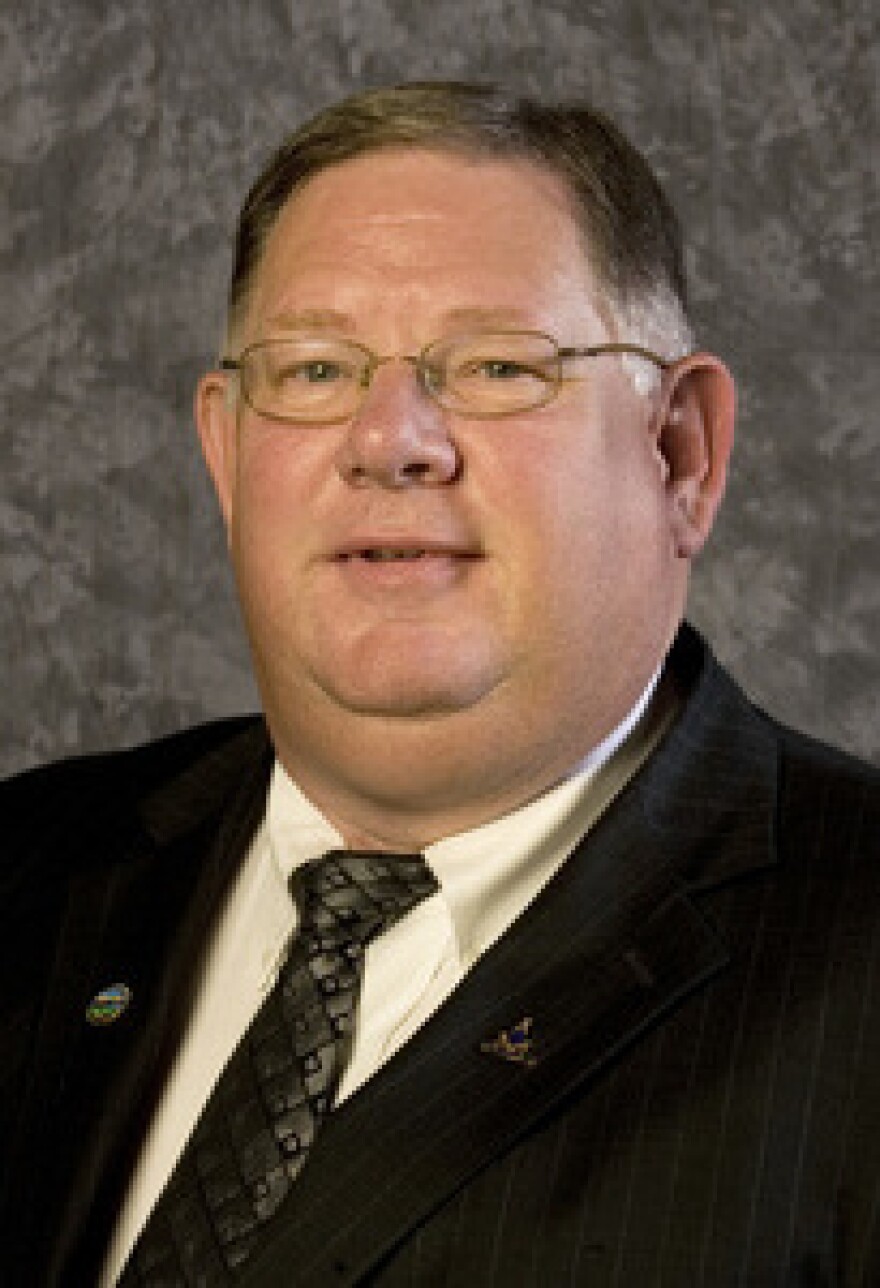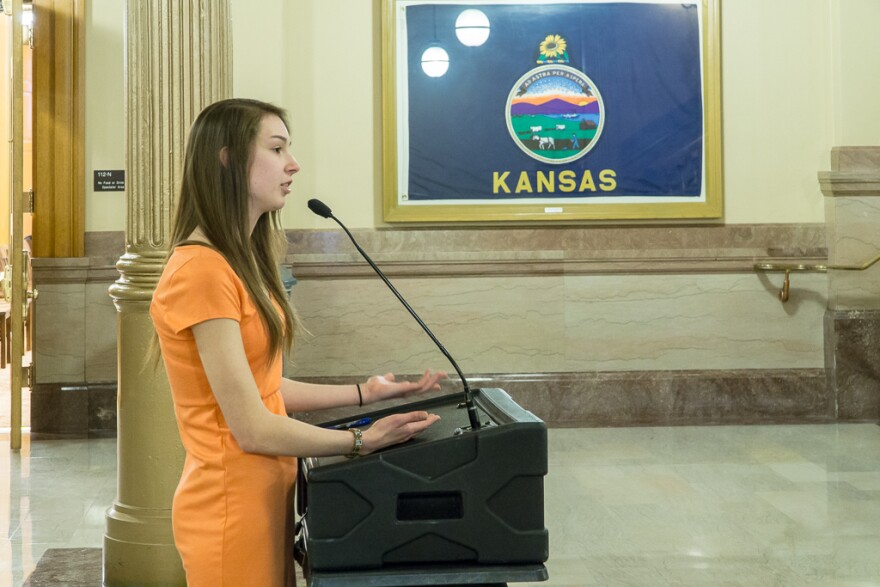President-elect Donald Trump is planning to repeal and replace the Affordable Care Act within the first 100 days of his administration, a move that will most likely stop efforts to expand the federal Medicaid program. The decision to expand or not was left up to state legislatures, and so far, Kansas lawmakers have chosen not to expand the state's privatized Medicaid program known as KanCare.
In 2017, the federal government would pay for 95 percent of expansion costs. Kansas is one of 19 states that has chosen not to expand the program, creating a gap that makes it hard for the working poor -- people like Marcillene Dover -- to get coverage.
Three years ago, Dover was diagnosed with multiple sclerosis, or MS, a potentially disabling disease of the central nervous system.
“They called me over the phone and said, ‘Hey, your MRI shows positive signs of having multiple sclerosis,’” she says.
That call came while she was on her lunch break at Wichita's North High, where she worked a tutor.
“And I just started crying because I imagined it going differently,” she says. “I imagined being more relieved because when you have something wrong with you and you have no idea what it could be, you would think that having some diagnosis would make you feel better. At least you have a name for it and there are other people who have what you have and are going through what you go through.”
But she wasn’t relieved, mainly because she didn’t have insurance.
“What am I going to do for that? Where am I going to go for primary care? And now I have to have regular appointments with my neurologist,” she says, recalling her thoughts as the diagnosis sank in.
At the time, Dover was a full-time student at Wichita State University and worked three part-time jobs. And she knew nothing about MS.
Her symptoms had started a full 10 months before her diagnosis.
“I was sitting at work one day and I just instantly felt different," she says. "My feet felt kind of numb and my legs were kind of weird. It was just a weird feeling."
At that point, Dover looked into getting student insurance through WSU, but she couldn’t afford it. She knew something was wrong and that she needed to see a doctor, so she went to a MedPed Clinic where the nurse said she needed an MRI. But without insurance, that wasn’t going to happen. Dover was told that her symptoms were likely caused by a pinched nerve, and she was sent to six weeks of physical therapy. It didn’t help, and she started experiencing more symptoms, such as slurred speech.
“I did some research on my own, looking stuff up, and I found out through Web M.D. that there are several things that I could have had,” she says. “And MS was one of them.”
Kansas chose not to expand Medicaid when the Affordable Care Act went into effect in 2014, which meant Dover could not get subsidized health insurance there, either. She fell into what is called the “KanCare gap,” making too much money to get KanCare yet too little to get the ACA discounts.
The ACA was designed to work by extending health insurance to people who make too much money to qualify for Medicaid but not enough money to get assistance to pay for insurance premiums in the health care marketplace, so when Kansas chose not to expand, it left a hole in coverage options.
Dover says that through a conversation with a co-worker, she learned that the MS Association of America could help her get an MRI for free—but first, she would have to be referred by a doctor. So as months passed and her symptoms persisted, Dover saved up the $300 to see a neurologist, who signed off on the free MRI.
A week later, Dover learned she had MS. But in the months leading up to that, the disease had taken a toll on her body.
“For people with MS, they prescribe a disease-modifying therapy drug, which the sooner you get on it, the sooner your body gets used to it, and then it can start to suppress the MS,” she says.
Just under a year had passed between Dover’s first symptoms and the phone call with her diagnosis. During that time she had three exacerbations, or irreversible flare-ups, of the disease.
“Every exacerbation that you get is a new lesion on your brain or spinal cord,” she explains. “And after that, they can’t do anything to get rid of those lesions. There’s no going back.”
In Sedgwick County, where Dover lives, a program called Project Access connects uninsured, low-income residents with doctors who donate care. Dover says that without the assistance she received from Project Access, she would be much worse off than she is now—physically and financially.
“So, every time I went and saw my neurologist, that was something that he was donating. And he could write that off on his taxes at the end of the year, but it was free for me, completely, to see my neurologist,” she says.
According to the Alliance for a Healthy Kansas, there are 150,000 Kansans in situations similar to Dover's. The alliance is a non-profit advocacy group formed to push for the expansion of KanCare, which would eliminate the coverage gap.
“A lot of these folks are hardworking Kansans that have jobs or are in school and holding part-time jobs, but just earning too little to qualify for the current program,” says David Jordan, director of the alliance.

In an effort to close the gap, the Alliance for a Healthy Kansas, along with the Kansas Hospital Association, has a plan before the state Legislature called the Bridge to a Healthier Kansas, which Jordan says would also create jobs and help keep rural hospitals open.
Under the plan, the state’s costs for the program would be close to $60 million in 2017, Jordan says, "which would be offset by additional revenues and savings, making it budget-neutral.”
The plan also requires people to make monthly payments into personal health care accounts. If they don’t, their coverage is terminated.
“Some state leaders unfortunately see this as an extension of the Affordable Care Act," Jordan says. "We think this is a Kansas-specific solution to the problem. Unfortunately, politics have gotten in the way.”
But Rep. Dan Hawkins, chair of the state’s House Health and Human Services Committee, says lawmakers aren’t opponents of Medicaid expansion; they’re opposed to the cost and the federal government’s influence that comes along with it.
“Our actuaries, our consultants who give us our figures, say that the bill that was presented this last session would cost us $55 million," Hawkins says. "And I’m here to say that $55 million is wrong. Not only is the Hospital Association wrong when they say it’s not going to cost the state anything, the consultants that give us the $55 million figure are wrong."
That’s because, according to Hawkins and research from the conservative think tank the Mercatus Center, costs for states that have expanded their Medicaid systems are, on average, 100 percent higher than projections.
“So if that holds true for us, just like it’s held true for virtually every other state, that 55-million figure doesn’t hold either," Hawkins says. "Now all of a sudden you take it up to $110 million."

Hawkins says that considering Trump's plans to repeal and replace the Affordable Care Act, Kansas may have “dodged a bullet” by not expanding Medicaid.
“Maybe it’s a good thing we didn’t do it if they’re going to do away with it,” Hawkins says. “Can you imagine starting a program and then saying ‘Oh, sorry. We made a mistake. We’re going to stop it now'?"
At any rate, Hawkins says, legislators would have to get over some hurdles before passing expansion. He says Gov. Sam Brownback isn’t likely to sign anything that doesn’t include a work requirement like the one that exists for food stamp recipients in Kansas.
“If we can assist people and get them back to work where they’re getting their health coverage through their work, that would be a good thing not only for them but it would be a good thing for the system also," Hawkins says.
Hawkins says a work requirement would only be allowed if the federal government loosens regulations surrounding Medicaid, but requests from states like New Hampshire and Indiana to include a work requirement have been struck down by the federal Center for Medicare and Medicaid Services. And according to the Alliance for a Healthy Kansas, most people in the KanCare gap are already working -- and still waiting for options.
So, while the Kansas Legislature waits for more clarity from the federal government, Hawkins' advice for people in the coverage gap is to take a look at their priorities.
“Not everybody, but a lot of people, if they’ve got $120 worth of cable [bills], and they’ve got $80 worth of cell phone [bills], that’s $200,” he says.
That’s money Hawkins says could actually go to pay for health insurance.
“But they just didn’t want to because the other stuff was more important,” he says.

For Marcillene Dover, the Legislature's thoughts and “inaction” miss the mark. She was working three jobs when she needed help getting subsidized insurance.
“I guess if you’ve never been a person without insurance, then to you it's just politics, it’s not a real day-to-day thing that you deal with," she says. "But if you are living uninsured, you’re very aware of that. And it’s not politics to you.”
Dover says she feels like a little bit of success story because she’s an exception to the narratives that usually accompany Kansans who need insurance coverage, but don’t have the means to pay for it. She's now a physics teacher at North High in Wichita. She has a full-time job with benefits, including affordable heath insurance.
“You know, being diagnosed with a disease was something I never expected to happen to me,” she says. "No one can really expect that kind of thing. That’s just a surprise that you get from life.”
--
Follow Abigail Beckman on Twitter @AbigailKMUW.
To contact KMUW News or to send in a news tip, reach us at news@kmuw.org.




